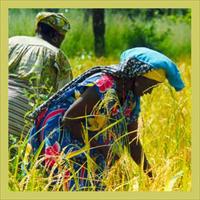GAMBIA: Juju Gassama “Growing Nerica has changed my life as a woman farmer”

Juju Gassama, 43, is a rice-farmer in western Gambia’s Jambur village, a small farming community 30km east of the capital Banjul. She is a member of the village’s Yiriwa Kafo, rice cooperative, which is made up of mainly women farmers.
“I started growing Nerica seven years ago. We were some of the first farmers in the country to use it. When Nerica seeds first came into the country, the National Agriculture Research Institute gave some seeds to women in Jambur. They were trying to build our interest in this new rice variety.
“We had left much of our farmland fallow for years before this. Now I grow three ‘kuntoo’ [equivalent to 4.5 hectares] of rice each year.
“We are mostly women here who grow rice – that is how it has always been in my country.
“I also grow Kokuru, a traditional rice grain. But there is a big difference between Nerica and Kokuru. Nerica yields much more grain than Kokuru. Before I only grew enough to feed my family, not to sell.
“Most of the farmers in my rice cooperative have shifted to Nerica. People are gradually abandoning the traditional variety.
“One of the advantages of Nerica is that we can grow it anywhere. It does not require much space. But most important for us, it has a good resistance to pests.
“Growing Nerica has changed my life as a woman farmer in many ways. My harvest has increased, making it much easier to feed my family. I can make a better living because I sell a bit of my rice each year to pay off my debts and to pay for my children’s school.
“It has also given me the opportunity to travel around the country and exchange my experience with other farmers.
“Our Jambur Yiriwa Kafo community cooperative is linked to a bigger national network of rice producers. It is through this cooperative that we were able to build our village seed store, where we store all our seed and sell the extra to people who need them.
“It is difficult for us to buy fertilisers; they cost too much. But our biggest challenge is getting access to a tractor to plough our farms. It is very difficult to find a tractor we can use. We don’t need animals here – but we would all use a tractor.”
 Back and Next - Back and Next
Back and Next - Back and Next See Also - See Also
See Also - See Also